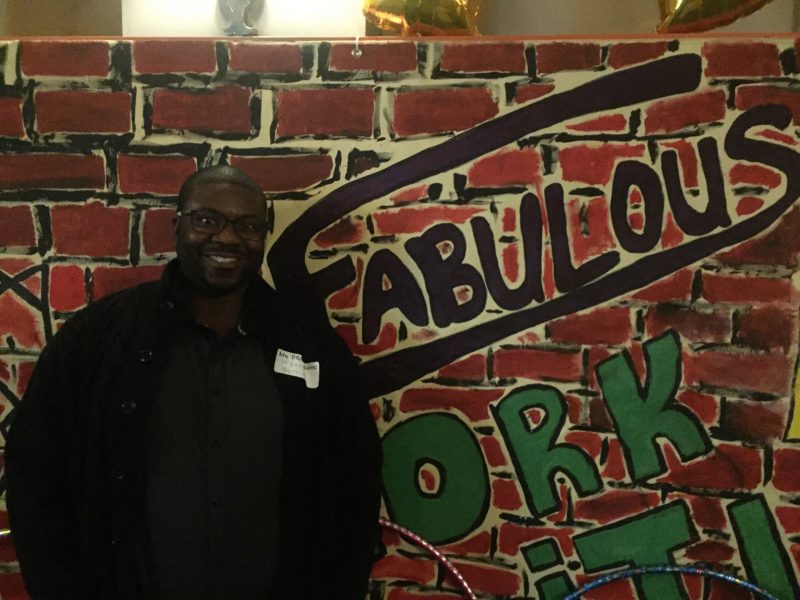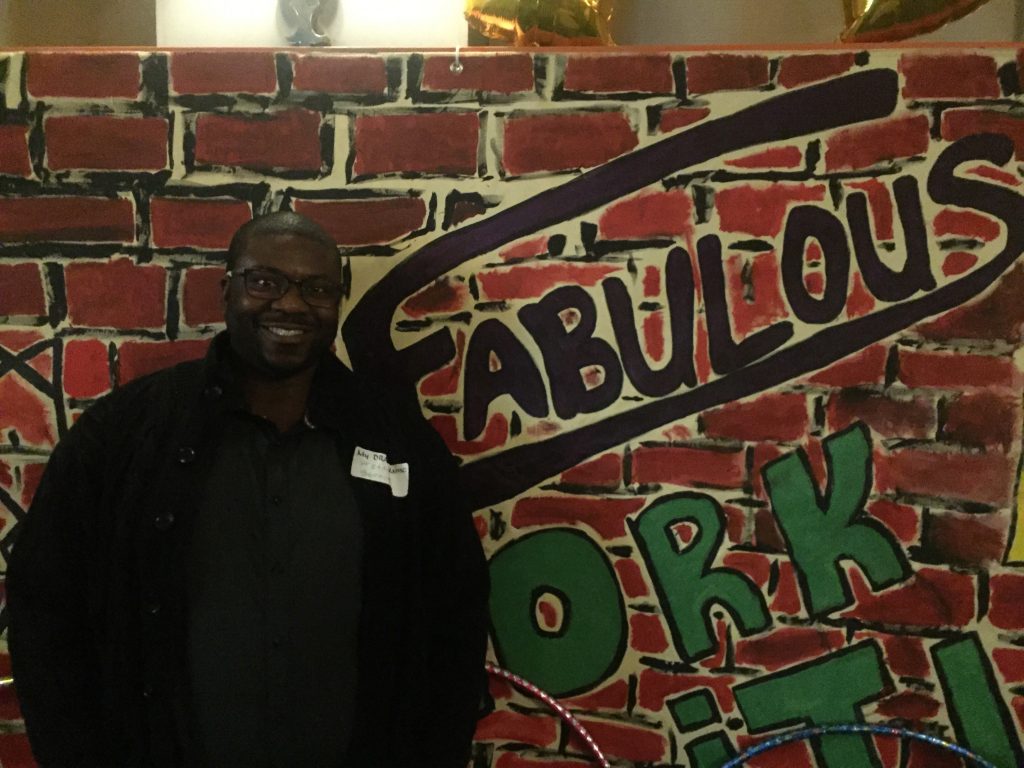“It’s just a tick, nothing to be worried about,” these are the words my family doctor said to me about the age of 11. I wasn’t sure why it was happening, but I knew enough to tell my mom that I needed it checked. With no answers at that time, that also meant there was little support from my parents to address what else could be the reason why I felt the way I did. I’m the son of Ghanaian immigrants who came to Canada as adults to pursue education and build a better life for themselves. There was my older sister, myself, and my younger sister living in Windsor, Ontario, CA and we were all very close. For years it felt like all we had was each other no matter what was going on with friends, neighbours, and sometimes family. My sisters were my best friends and that stays true to this day.
I was very different from my family in that I had an overactive imagination; I would love to spend time alone making up my own superhero characters and acting out their stories lines in the basement for hours. My parents often didn’t understand why I would choose to live in a fantasy world over doing homework, going outside with friends, doing chores, or being social. Now at this point my parents knew that I had issues at school with my peers; I was overweight and was constantly teased, bullied, and overall excluded from belonging to most groups. The verbal and emotional abuse by my peers also lead to struggles with my schoolwork, and teachers becoming very frustrated that I was a “nice kid” but just needed to “apply myself.” Looking back, I better understand that it was difficult to “apply myself” fully, when I was emotionally hurting from the unkind words and peer exclusion. It’s unfortunate that this type of understanding and compassion wasn’t shown to me at the time, however today, I work on extending this type of understanding and compassion to myself.
My parents being hard working people who rose from the depths of poverty in Ghana, West Africa really only knew how to address my school issues; don’t get me wrong, my parents did everything for us to ensure we had the best life possible and I thank them every day for values they instilled around hard work and education. However, they were not equipped with the tools to fully recognize the effects of kids calling me names like “blubber chunk” would have on my motivation for schoolwork. They did make sure I was enrolled in counselling with the school which I continued with for many years. My parent’s primary focus was me doing better in school yet lacked the insight to connect the emotional wellness components.
The first reaction might be “how could they not know?!” However, I understand that my parents grew up with the teachings that if you had a good home, a good education, and enough money to take care of your family, then you should not have worries in life. My parents didn’t grow up in a world where emotional identification and regulation were at the top of the list as opposed to ensuring that your entire family could eat and have clothing. To my mom the issues I would express were very “Canadian” because people in Ghana did not have the “luxury of being depressed.” I also understand and acknowledge that all over the globe, emotional regulation and healthy identification and expression of feelings is not always taught, and is largely overlooked and underfunded.
Through my high school and early adulthood I went through a very long phase of “faking it till you make it” in a sense where I created a version of myself that was not entirely me, but I knew it was what everyone else would like. I pushed away all my own issues and took on everyone else’s, and I mean everyone! Closed friends, acquaintances, co-workers, strangers in life and online, anyone who had an issue I was your “therapist hero” and wore that proud! What I didn’t realize at the time was I was avoiding all my anxious feelings and was keeping myself distracted by issues that were not my own. I had not heard of the term “codependency” at that time and am still leaning about what codependency means.
Fast forward to my life as a Social Worker (big shock there right?) and working for the provincial government in Alberta. I’m two provinces and roughly a 9 hour flight away from everyone and anyone I ever knew. Being far away and alone, I started to have space to reflect on life. I don’t believe it was strictly the fact that was I was alone in a new place that I was suddenly inundated with my thoughts; I believe that by working directly with marginalized and vulnerable populations and trying to encourage people to seek help for their past trauma, I learned the importance of needing to be aware of my own anxious feelings that I had been suppressing for so long. I realized that a lot of choices were made, relationships were pursued, and opportunities were missed because I wanted to avoid feeling anxious. Initially when I wrote this, I wrote “bad” choices and relationships, however I choose to take that word out, as I am learning to apply compassion towards myself, and understand that although these choices and relationships were not in my best interest, they helped me gain valuable insight that I am thankful to now have.
I started to feel and think a lot, all at once, with limited tools, and I started to feel depressed. I began to isolate myself from family, friends, co-workers, it was a difficult time that I didn’t really know how to deal with. I thankfully met my partner during this time, and she began to encourage me to get clinical help for my issues as I had very low self esteem and felt like I didn’t deserve to address my issues. She helped me understand that I am worth something (this plus many other reasons is why are getting married!). So this began my first round of therapy where I attempted address my issues of putting the needs of others ahead of my own in order to feel good about myself; it was the first step to learning that I need to love myself which has been a long journey. I only had a few sessions that were covered by my work so I didn’t continue for a long time after that, but I still had irrational thoughts happening, negative self talk along with frustration that I was not doing as well as I would like at work.
I started to have physical reactions at times (my body would shake, shortness of breath would occur, and I would just start to cry) when having hard conversations at home that I now know were panic attacks (who knew?). Growing up in my household, the concept of seeking medical attention for a mental health issue was not something we spoke about; we were told to talk about it, try to move on, but most importantly to pray. I’m not saying these things are not the answer, but I am saying that I know I needed more. I went to a walk-in clinic where they provided me an anxiety screening tool to complete. I had to be very aware of my feelings and tell the truth when doing this so you can imagine how hard it was to check off boxes that described these horrible feelings I’ve been trying to ignore for a very long time. The doctor was great in talking me through my results and quickly prescribed me some medication to help treat anxiety. In order to ensure that I had a way to follow up he became my family doctor that day.
I started counselling again because I knew I still had some trauma that I needed to address and knew that the pills alone wouldn’t help me reconcile things of the past. My family struggles to understand why it’s difficult for me to call them at times or why I get nervous doing what would seem to be simple things in life, but they are they for the most part trying. I have a great partner who listens to me and provides me with prompts to take time to appreciate myself and tells me I’m worth it. I’m learning every day how to identify when I’m feeling anxious, and how to reframe my thoughts in order to keep my energy up. Not every day is a great day, but I know now that it’s not my worst day. I also have learned that these feelings will pass, and that sometimes, I need to sit in the uncomfortable feelings, as opposed to distracting myself when I notice them popping up. Easier said than done, but I’ve made progress and am proud of myself!
I internalized the concept that nothing could be wrong with me at a young age and wish I did not miss out on so much time understanding who I was as a person. Although I don’t blame my childhood doctor for invalidating my feelings about something not feeling right, but I do wonder how things could have been different if I hadn’t heard the words “it’s just a tick.”









Leave A Comment